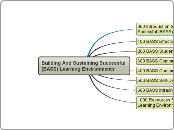Building And Sustaining Successful(BASS) Learning Environments
000 Introduction to Building and SustainingSucessful (BASS) Learning Environments
Building and Maintaining Learning Environments
Tool Resource Library
SSDL (Staged Self-Directed Learning Model
Learning Theories
Working hypotheses
Brain Based Natural Learning Systems
Others introduced in appropriate modules
100 BASS Effective Content
Content is not enough, necessary but not sufficient
SSDL mode (Staged Self-Directed Learning)
VARK Learning Styles
Inverted Pyramid
Multi-sensory
Accessible
Optimizing media for web delivery
Publishing syllabus online
State the learning objectives
Provide accommodation statement
Stress academic integrity
Publish your office hours
Publish your preferred means of contact
Maintaining content over time
Update and refresh content
Effective Content
On the ground
Online
In other contexts
Relevant college policies and expectations
200 BASS Student Motivation
Evaluate if students are ready to go forward
Share why you are excited by your subject
Apply principle of andragogy
Act as coach
Stimulate positive emotions
Provide clear guidance
Give positive feedback
Encourage good work
Praise good interactions with other students
Use scaffolding
Model desired outcomes
Build on brain-based learning systems
Stress academic integrity
Fair play
Self-esteem
Listen to feedback from students
Motivating Studetns
On the ground
Online
In other contexts
Relevant college policies and expectations
300 BASS Communication and Collaboraration
Evaluate if students are ready for cooperative learning
Create opportunities for collaboration
Use Groups
Partner with students
Build safe environments
Apply social learning theory
Distinguish carefully between cheating and collaborating
Understand uses of different communication channels
Communicating and Collaborating
On the ground
Online
In other contexts
Relevant college policies and expectations
400 BASS Communities for Learning
Build safe environments for learning
Accept displays of multiple intelligences
Apply social learning theory
Promote displays of diversity
Maintain scholarly civility
Apply student feedback
Apply Maslow's hierarchy
Building community
On the ground
Online
In other contexts
Relevant college policies and expectations
500 BASS Self-Directed Learning
Explain your role to students
Structure Self-Directed Projects
Encourage Exploration and Discovery
Set the parameters and expectations
Use Problem Based Learning
Provide expert assistance
Be open to new ideas
Monitor progress without interfering
Intervene appropriately
Self-Directed Learning
On the ground
Online
In other contexts
Relevant college policies and expectations
600 BASS Intra/Interdisciplinary Programs
Seek opportunities to partner in your discipline
Seek opportunities to partner across disciplines
Seek opportunities to partner across institutions
Set overall outcomes for students (type of person he or she should become)
Role of Cross-Course Competencies
Interdisciplinary Programs
On the ground
Online
In other contexts
